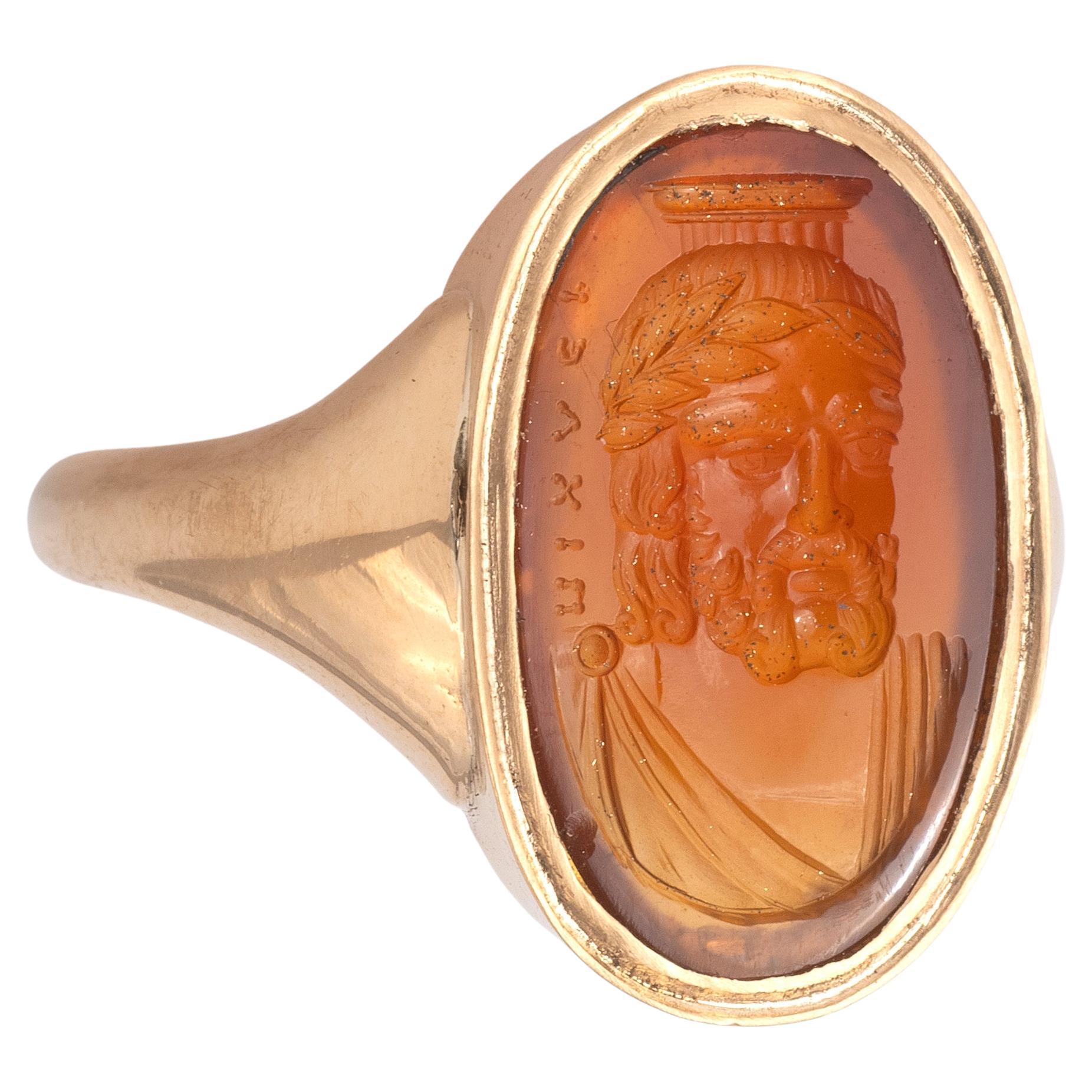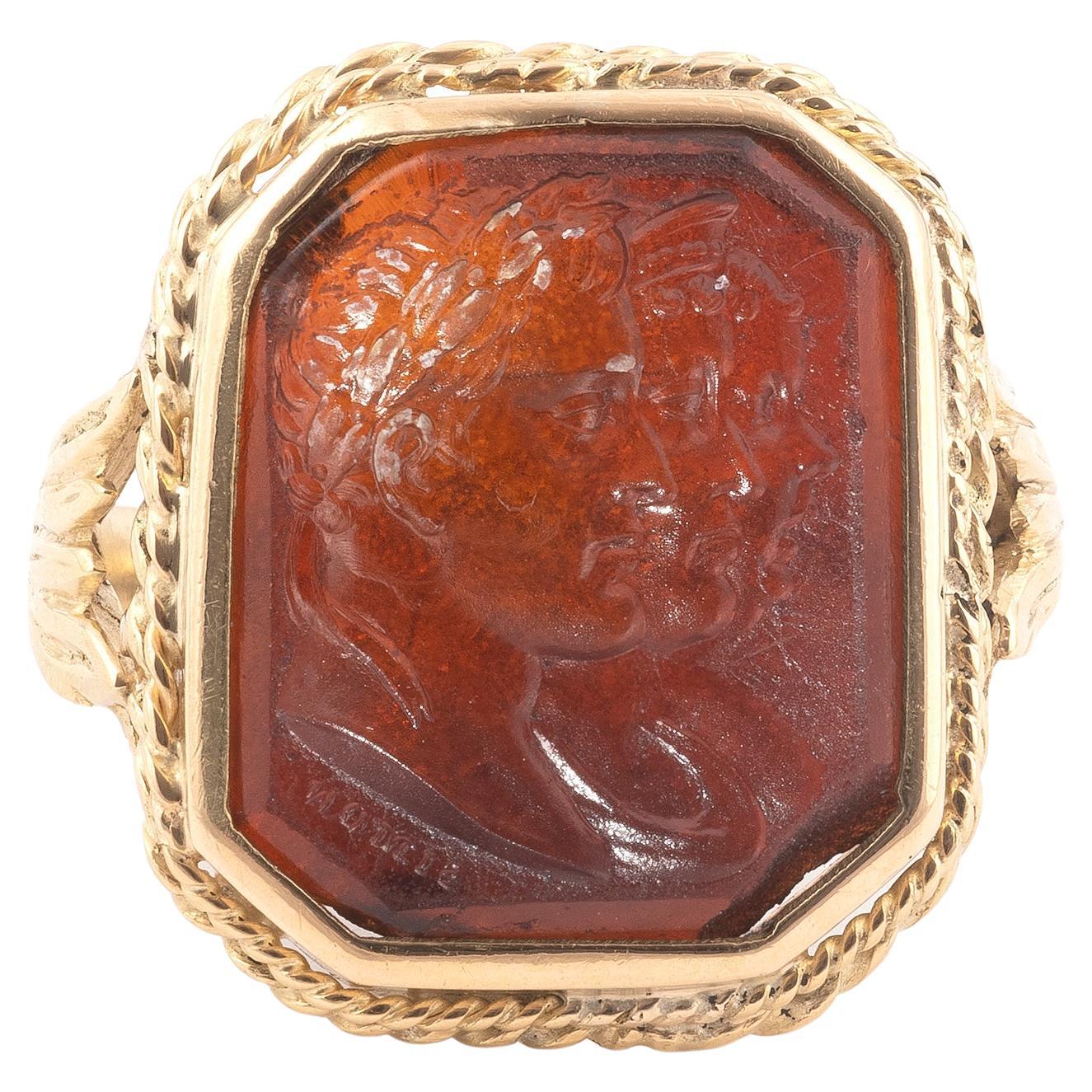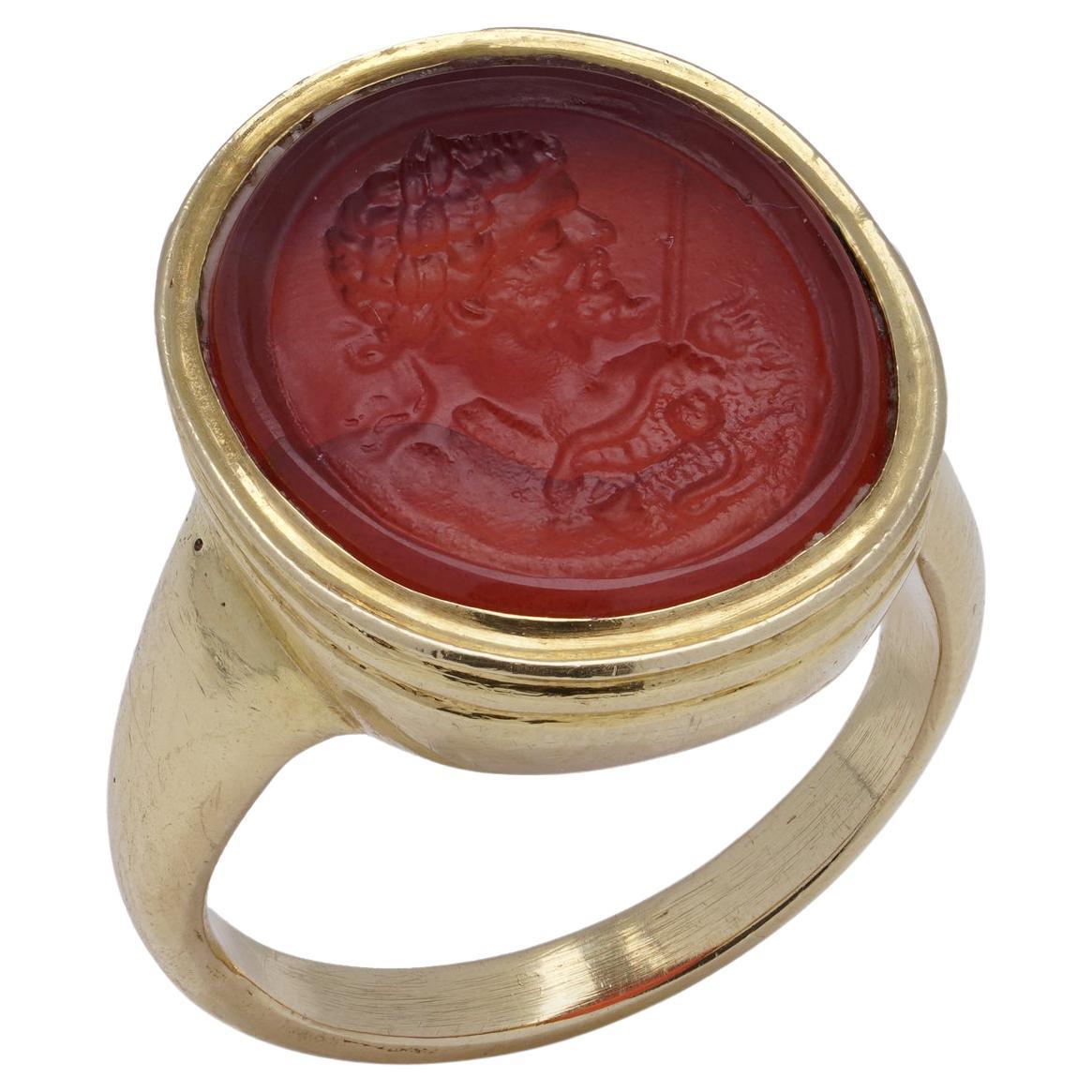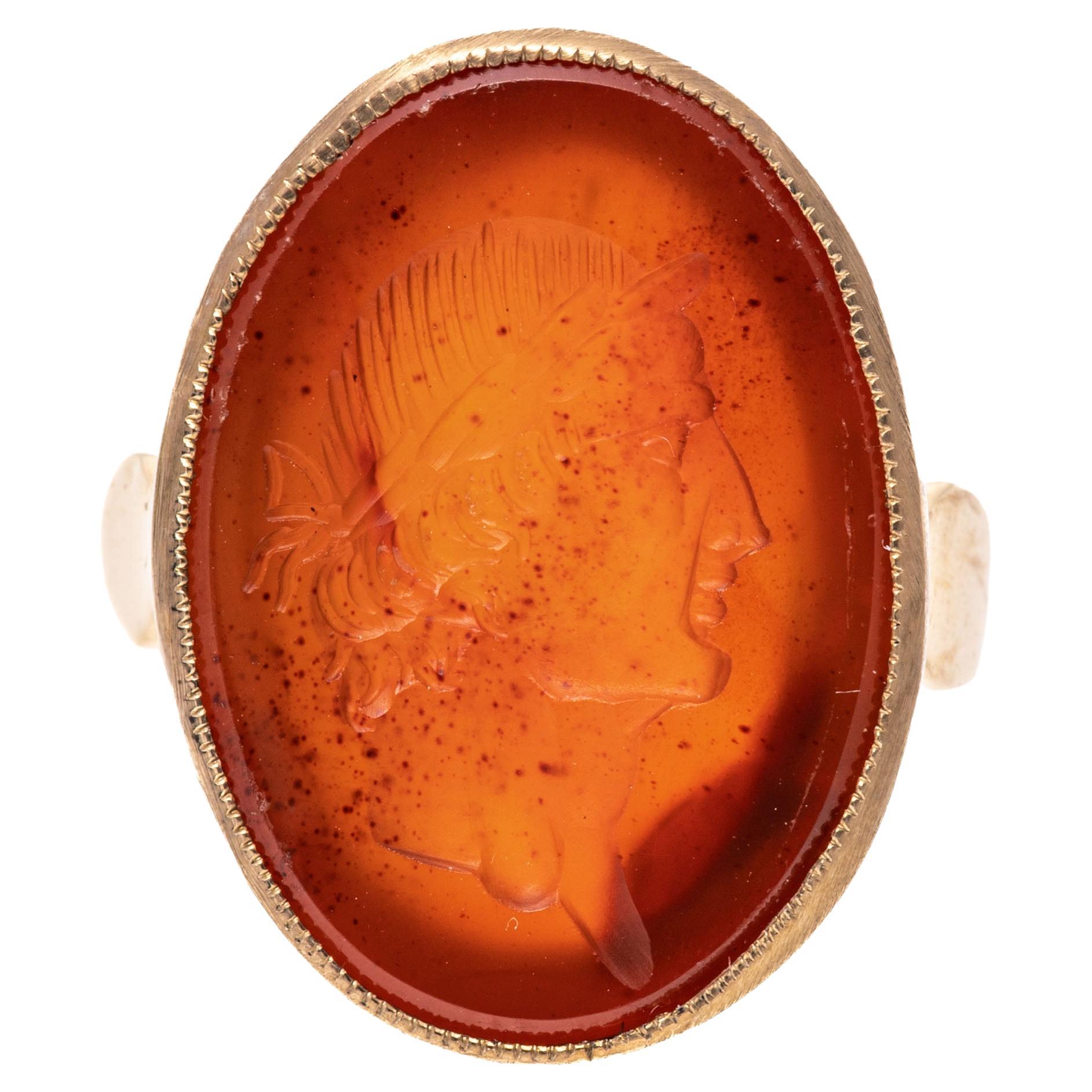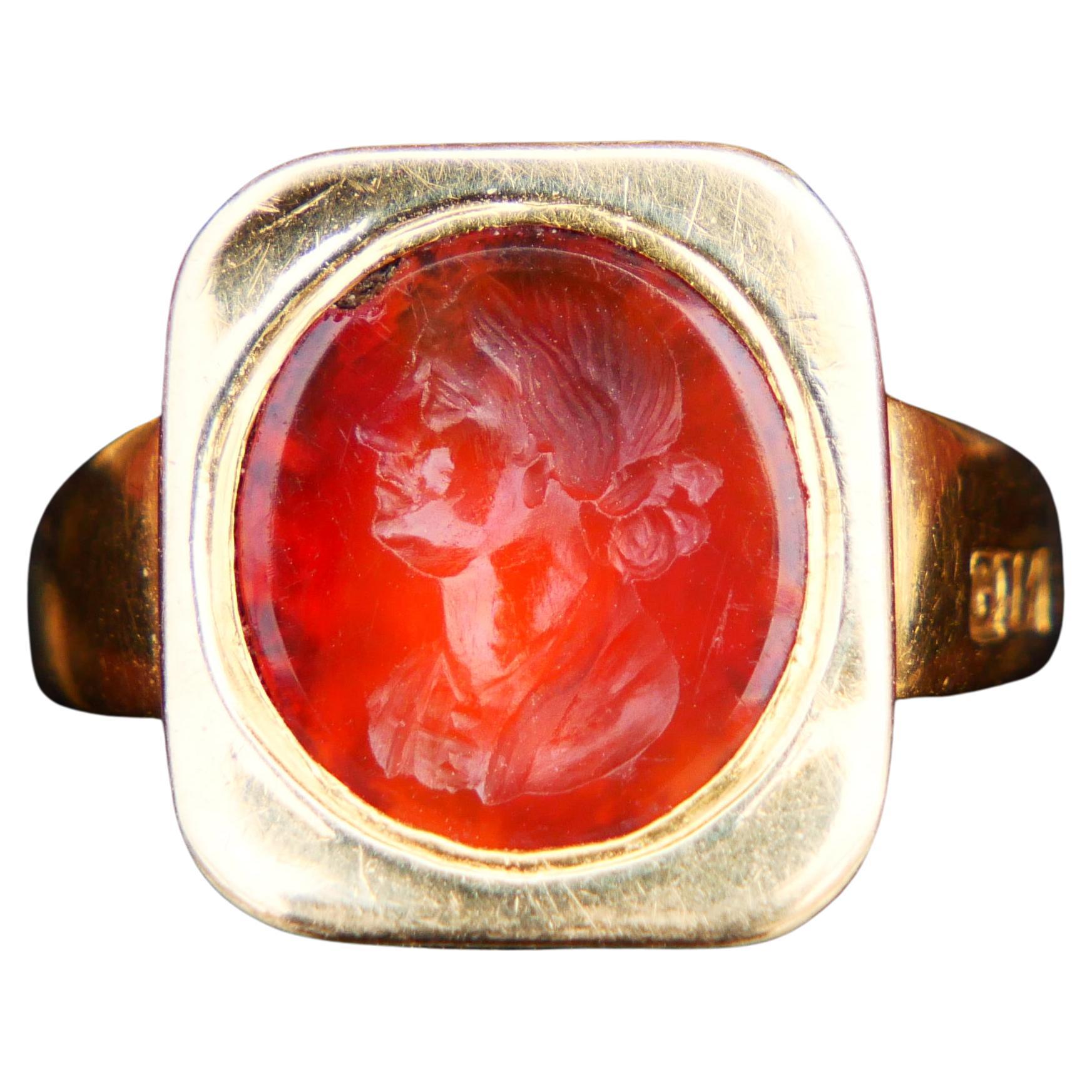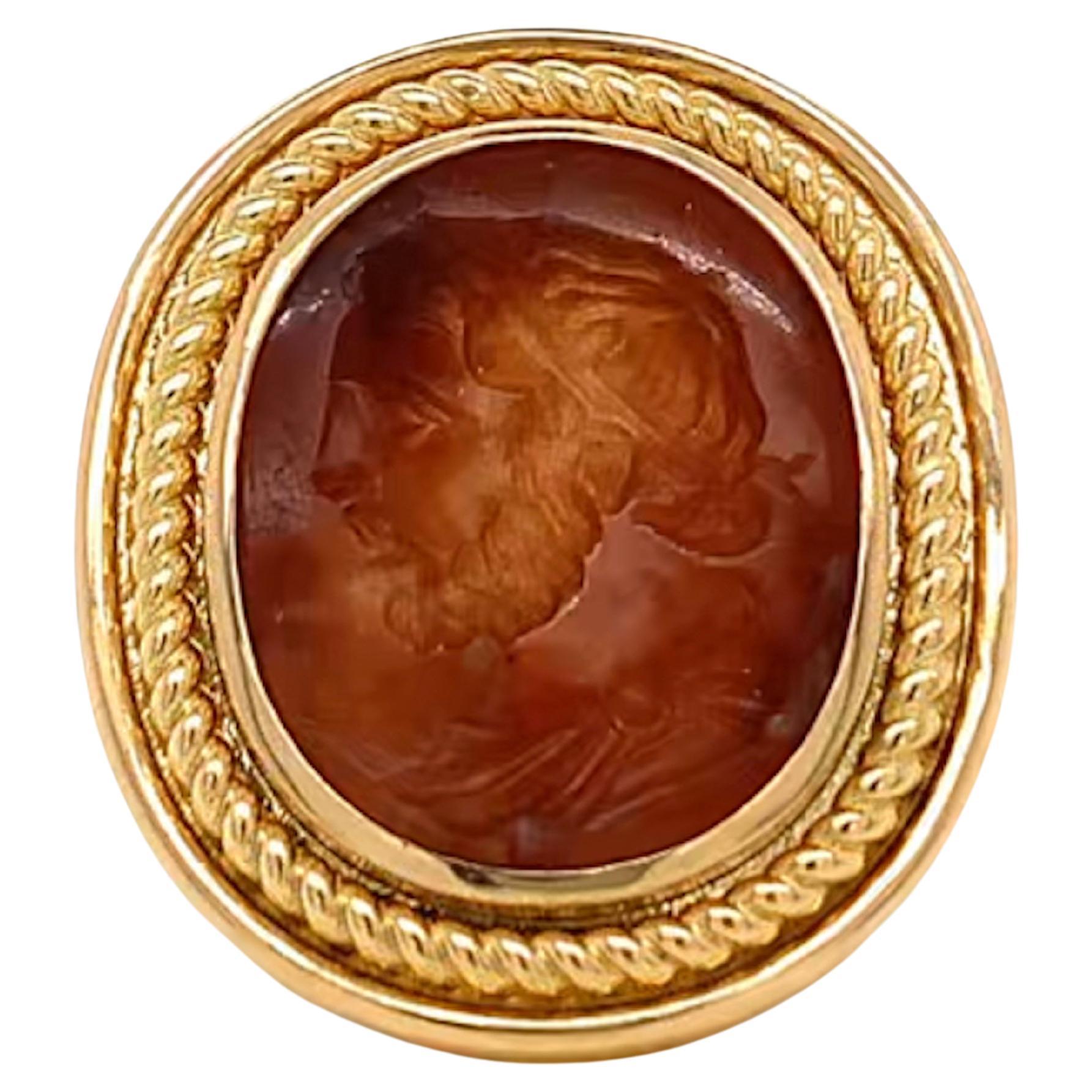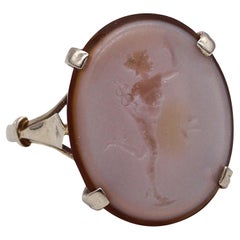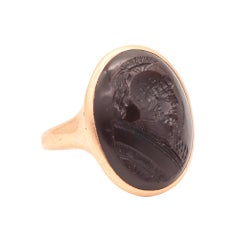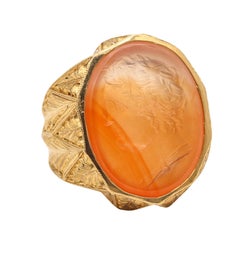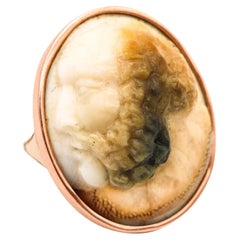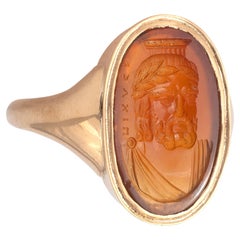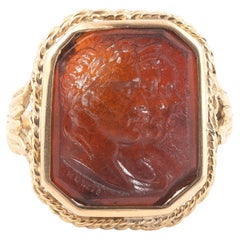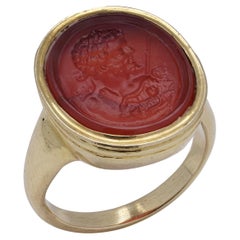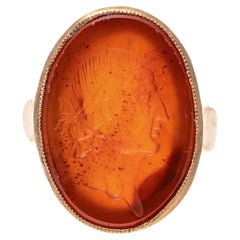Items Similar to Giovanni & Luigi Pichler 1790 Oval Intaglio Carved In Amber Mounted in 18Kt Ring
Want more images or videos?
Request additional images or videos from the seller
1 of 8
Giovanni & Luigi Pichler 1790 Oval Intaglio Carved In Amber Mounted in 18Kt Ring
$15,800
$19,75020% Off
£11,988.68
£14,985.8520% Off
€13,707.98
€17,134.9720% Off
CA$22,068.32
CA$27,585.3920% Off
A$24,536.96
A$30,671.2120% Off
CHF 12,811.85
CHF 16,014.8120% Off
MX$298,674.60
MX$373,343.2620% Off
NOK 163,473.61
NOK 204,342.0220% Off
SEK 153,166.96
SEK 191,458.7020% Off
DKK 102,305.17
DKK 127,881.4720% Off
Shipping
Retrieving quote...The 1stDibs Promise:
Authenticity Guarantee,
Money-Back Guarantee,
24-Hour Cancellation
Return Policy: Please be advised, certain types of customizations are not eligible for returns.
About the Item
Important carved intaglio ring by Giovanni or Luigi Pichler (1773-1854).
Fabulous and extremely rare intaglio seal piece, created in Europe by the Pichler's Atelier in the late 18th century, circa 1790-1800. It was carved in an oval cabochon cut shape, from a single piece of natural translucent Amber of about 10 carats.
Mounted in an early 19th Century neo-classic ring crafted in solid 18 karats white gold. The flanks and borders of the ring's setting are decorated, with organics motifs characteristics from the period.
The seal depicts the profile of the naked portrait of the Roman goddess Venus, (Aphrodite) facing to the right, with a bow and decorations in the hair. Is signed at the lower left, Pichler in Greek (ΠΙΧΛΕΡ), for Giovanni or Luigi Pichler (1773-1854).
In Roman mythology, Venus was the goddess of love, sex, beauty, and fertility. She was the Roman counterpart to the Greek goddess Aphrodite. However, Roman Venus had many abilities beyond the Greek Aphrodite; she was a goddess of victory and fertility.
This ring Have a total weight of 7.1 Grams and the actual size is 5.25, sizeable. The top view measure are 21 mm by 25.6 mm (0.82 by 1.01 Inches).
Anton Pichler [Pikler] (Austria 1697-1779 Rome) Was the patriarch of the Pichler (ΠΙΧΛΕΡ) empire. He was an Austrian-German gemcutter who migrated to Naples, and then to Rome in 1743, where he was known as Antonio and gained great fame for the precision-beauty of his craft. Antonio trained his son Giovanni Pichler (1734-1791) as a worthy successor. Then in 1773 after he was past 75 Antonio fathered another son, Luigi-39 years the junior of Giovanni, his half-brother. Luigi Pichler was still a small child when Antonio died, but loyal Giovanni saw him raised as another worthy successor and accomplished artist. Luigi then carried forward the family business of classically-inspired luxury gem-cutting in Rome until his retirement in 1850, more than 100 years after his own father had founded the Pichler house.
Giovanni Pichler (Naples 1734-1791 Rome) was born in Naples Italy and trained by his father Antonio Pichler in the art of gem engraving in Rome. In 1769 he was appointed gem engraver to Emperor Joseph II in Vienna. Pichler's fame rapidly increased and he became a favorite of Grand Tourists. He also trained a number of the most famous engravers of the next generation including Filippo Rega and Antonio Berini. Upon his death in 1791 his workshop was inherited by his half brother Luigi Pichler. He went on to work for the Habsburg Imperial family in Vienna and so impressed the French court jeweler François-Régnault Nitot that the latter tried to persuade him to move to Paris. Luigi received many distinctions later in life including a diploma from the Academy of St Luke and membership of the Academy in Venice, as well as, in 1839, Knight's Cross of the Order of St Gregory the Great and, in 1842, of the Order of St Sylvester. He cut, after 15 years, a Hercules in Combat with the Nemean lions, a generally admired piece. His gems, both recessed and embossed, are of outstanding clarity and sharpness and he was one of the most sought-after engravers of his age, leaving him with a prolific 379 pieces to his name. He also worked in pastel painting. In 1790 he produced a catalogue of 200 examples of his work.
Luigi Pichler (Rome 1773-1854 Rome), was a member of the celebrated family of German-Italian gem engravers, studied under his father Anton Pichler and his elder half-brother Giovanni. Towards the end of the 18th century, he visited Austria where he attracted wide foreign patronage and in 1808 was presented to Emperor Francis I in Vienna. In 1818 he was appointed Professor of Gem Engraving at Akademie der Bildenden Künste in Vienna, a post he held until 1850 before retiring to Rome. He was known for his contemporary portraits and "his preferred medium was intaglio distinguished by exquisite polish and often executed in gemstones rather than the more usual hardstones" (Grove Dictionary of Art). Like all members of his family and according to common practice of the day, he signed his work in various ways, including his name, last name (ΠΙΧΛΕΡ) and initials in Greek and Roman letters. He turned back to Rome in 1850, where he died in 1854.
About the signature of this piece, we are citing as a reference, a text from the catalogue of the Hull Grundy Gift (Gere et al 1984) no 834: This form of signature was used by both Giovanni and his half-brother Luigi. The style of the intaglio suggests a late eighteenth-century date, and an attribution to a late work by Giovanni, is consistent with other gems from his hand, but Luigi was taught by his half-brother and took over his unfinished work in 1791. Dalton says of Giovanni: “.... they can be very much alike ... when ... Luigi Pichler copied one of Giovanni's gems and signed in the same way as his brother, it is difficult to be sure which of the two was actually the artist.” Rollett (1874) lists only two intaglios of this subject, both as by Giovanni (no's 54 & 55), so it seems safe to assume that this gem was cut by him. An account of Giovanni's life was published in Rome the year after his death (see de Rossi 1792). (Charlotte Gere).
Chronology of the Pichler's signatures:
Giovanni Pichler (1734-1791) ΠΙΧΛΕΡ
Luigi Pichler (1773-1854) Λ.ΠΙΧΛΕΡ (note the addition of the L in Greek).
Literature: Dr. Hermann. Rollett, “Die Drei Meister der Gemmoglyptc, Antonio, Giovanni und Luigi Pichler”, Vienna, W. Braumüller 1874, page 65, No 133. for an almost identical piece. Duffield Osbourne “Engraved Gems” H. Holt & company,1912 Plate XXXI number 4, for similar examples.
Related Bibliography: Dr. Hermann. Rollett, “Die Drei Meister der Gemmoglyptik: Antonio, Giovanni and Luigi Pichler” Vienna, W. Braumüller, 1874. For his biography. R. Distelberger, “Luigi Pichler' in 'Österrechisches Biographisches Lexikon”, Vol 36, Vienna 1979. For similar pieces. L. Forrer, "Biographical Dictionary of Medallists", Volume VIII, Spinks & Son, London 1930, Pp-126-127. For Inventories. Gabriella Tassinari, “Lettere di una celebre famiglia di incisori di pietre dure : i pichler”. article 2005. Gabriela Tassinari, "I ritratti dei viaggiatori del Grand Tour sugli intaglio ed i cammei di Giovanni Pichler", in Bollettino del Centro Interuniversitario di ricerche sul viaggio in Italia; 26:1 (2005), Pp. 11-79. Lippold, Gemmen und Kameen des Altertums und der Neuzeit, Stuttgart, 1922, pl. CXXVII, no. 7; B. Baumgärtel,Angelica Kaufmann (1741-1807), exh. cat. Kunstmuseum, Dusseldorf; Haus der Kunst, Munich; Bündner Kunstmuseum, Chur, 1998, pp. 338-9. L. Bignamini, C. Hornsby, Digging And Dealing In Eighteenth-Century Rome (2010), Pp 316-317. Seidmann, "The Grand Tourist's favourite souvenirs: cameos and intaglios", in RSA Journal (1996), Pp. 63-66. Catalogo di impronti cavati da gemme incise dal Cavaliere Giovanni Pichler ... (1790).
Collections: The British Museum, London, UK. The Victoria & Albert Museum, London UK. The Corning Museum of Glass, New York, NY. The Walters Art Museum, Baltimore, MD. The Hermitage Museum, St Petersburg Russia. The Metropolitan Museum of Art, New York, USA.
Note: The plaster cast impression of this gem engraving can be found in, Duffield Osbourne, “Engraved Gems”, H. Holt and company,1912 Plate XXXI number 4.
Note: The carving of this piece in natural Amber, it is a great discovery of the work done by the Pichler family, this is the only known piece carved in this material. It should be noted that Amber is a very difficult one to work in low reliefs due to the fragility of the material.
Note: An engraved gem, frequently referred to as an intaglio, is a small and usually semi-precious gemstones that has been carved, in the western tradition normally with images or inscriptions only on one face. The engraving of gemstones was a major luxury art form in the ancient world, and an important one in some later periods.
This is an extremely rare piece, it is in great condition and the intaglio carving are perfect.
INVENTORY REF: R0000CNNB/.1682
- Creator:Luigi Pichler
- Ring Size:5.25 US, Resizable
- Metal:
- Stone:Amber
- Stone Cut:
- Weight:7.15 g
- Style:
- Place of Origin:
- Period:1790-1799
- Date of Manufacture:1790
- Condition:Wear consistent with age and use. An extremely rare piece in excellent condition.
- Seller Location:Miami, FL
- Reference Number:Seller: R0000CNNB/.16821stDibs: LU2690215468742
Resizing is available.
May be sized on requestAbout the Seller
5.0
Recognized Seller
These prestigious sellers are industry leaders and represent the highest echelon for item quality and design.
Platinum Seller
Premium sellers with a 4.7+ rating and 24-hour response times
Established in 1995
1stDibs seller since 2022
917 sales on 1stDibs
Typical response time: <1 hour
- ShippingRetrieving quote...Shipping from: Miami, FL
- Return PolicyPlease be advised, certain types of customizations are not eligible for returns.
Authenticity Guarantee
In the unlikely event there’s an issue with an item’s authenticity, contact us within 1 year for a full refund. DetailsMoney-Back Guarantee
If your item is not as described, is damaged in transit, or does not arrive, contact us within 7 days for a full refund. Details24-Hour Cancellation
You have a 24-hour grace period in which to reconsider your purchase, with no questions asked.Vetted Professional Sellers
Our world-class sellers must adhere to strict standards for service and quality, maintaining the integrity of our listings.Price-Match Guarantee
If you find that a seller listed the same item for a lower price elsewhere, we’ll match it.Trusted Global Delivery
Our best-in-class carrier network provides specialized shipping options worldwide, including custom delivery.More From This Seller
View AllGiovanni & Luigi Pichler 1790 Rare Agate Carved Intaglio of Mercury in 14kt Gold
Located in Miami, FL
Important carved intaglio ring by Giovanni or Luigi Pichler (1773-1854).
An extremely rare intaglio seal piece, created in Rome Italy by the Pichler's Atelier in the late early 18th century, circa 1795. It was carved in an oval cabochon cut shape, from a triple layered translucent bluish agate.
The intaglio seal depicts the naked figure of the Roman goddess Mercury, in running flying position to the right with a helmet and winged sandals. Raising his left hand and holding a trophy with the right hand. A butterfly or flying insect at the right. Signed, Pichler in Greek (ΠΙΧΛΕΡ), for Giovanni or Luigi Pichler (1773-1854).
This seal has been made after the famous Flying Mercury (Mercure volant) statue, created by the mannerist sculptor Giambologna (Giovanni da Bologna 1524-1608), a Flemish-Italian sculptor that work all his life mostly in Florence in Italy. One of the versions of the actual sculpture is located at the Bargello Museum in Florence Italy and the other at the Louvre Museum in Paris.
Mercury. in Latin Mercurius, in Roman religion is the god of shopkeepers and merchants, travelers and transporters of goods, and thieves and tricksters. He is commonly identified with the Greek Hermes...
Category
Antique Early 18th Century Italian Classical Roman Signet Rings
Materials
Fire Agate, Agate, White Gold, 14k Gold, Gold
$4,788 Sale Price
20% Off
Free Shipping
INTAGLIO 1900 Antique Signet Ring In 14Kt Yellow Gold With Carved Brown Agate
Located in Miami, FL
An antique intaglio signet ring.
This is a gorgeous antique signet ring, created in England during the Edwardian period, back in the 1900. The ring has been crafted with smooth line...
Category
Antique Early 1900s English Edwardian Signet Rings
Materials
Agate, 14k Gold, Yellow Gold, Gold
$1,800 Sale Price
20% Off
Free Shipping
INTAGLIO 1920 Art-Deco Signet Ring In Solid 18Kt Yellow Gold With Carved Agate
Located in Miami, FL
An antique intaglio signet ring.
This is a fabulous antique intaglio signet-ring created in America during the art-deco period, between the 1915 and 1920. The ring has been masterfu...
Category
Vintage 1920s American Art Deco Signet Rings
Materials
Agate, Gold, Yellow Gold, 18k Gold
$3,720 Sale Price
20% Off
Free Shipping
Victorian 1870 Operculum Carved Shell Memento Ring In 14Kt Yellow And Rose Gold
Located in Miami, FL
Victorian ring with carved operculum shell
An extremely rare piece, created in England during the high Victorian era (1837-1901), back in the 1870. This is a very unusual memento carved cameo ring, carefully crafted with an oval shape in solid yellow and rose gold of 14 karats with polished finish. It is mount with a high relief cameo style masterfully carved with impeccable and precise details.
Operculum Shell: Mount on top in a bezel setting, with 1 round cabochon cut (23 x 18 x 10 mm) of a natural operculum shell. It is carved in high relief, with the portrait of a bearded man facing to the left,
Weight: 9.63 Grams, (6.17 Dwt).
Size: 4.5 and may be resized on request.
Measurements: 26 mm by 21 mm (1.02 x 0.83 Inches) and raise 10 mm over the finger.
Hallmarks: No marks as usual. Was electronically tested for 14 karats gold.
Victorian Jewelry
This era was one of the most influenced and influential periods of antique jewelry. This period is defined by the British monarch, in this case, Alexandrina Victoria, the Queen of the United Kingdom of Great Britain and Ireland, as well as the Empress of India, years 1837-1901. There are 3 sub-periods within this era. First, the early, Romantic period, which is soaked in traditions, natural motifs in gold and silver, clear stones only being worn during the day and colored gems by night. The second being the Grand or mourning period, which coincides with the death of Queen Victoria's husband, Prince Albert the consort, who died in December of 1861. This period included large, dark, somber, dramatic jewelry, with a lot of black onyx, jet wood, amethyst, garnet and gold. This lasted until 1880's, when the aesthetic period of jewelry began. The Late or third stage of the Victorian period, use more complex and feminine motifs, returning to the natural, including many floral and celestial designs, with more decadent gemstones, lasting until the turn of the century. The Victorian era of jewelry includes many movements found in other countries, including revivals such as the Etruscan the Roman and the Egyptian as well as the Art Nouveau, Liberty style and Arts and Crafts design movements which lead into the beginning of the twentieth century.
Operculum Shell Jewelry
First of all these unusual black and brown shells have a cat’s-eye appearance and were common used in Victorian jewelry. Operculum is Latin for “lid” or “cover” and is a unique type of freshwater snail shell. Widely popular in the Victorian era, operculum jewelry...
Category
Antique 1870s English Victorian Dome Rings
Materials
Natural Pearl, Yellow Gold, Rose Gold, 15k Gold, 14k Gold, Gold
$2,228 Sale Price
20% Off
Free Shipping
KIESELSTEIN CORD 1984 Signet Intaglio Ring In 18Kt Yellow Gold With Bloodstone
By Kieselstein
Located in Miami, FL
A signet intaglio ring designed by Kieselstein-Cord.
This is a massive oversized signet ring created in New York City at the jewelry atelier of Kieselstein-Cord, back in 1984. This ...
Category
Vintage 1980s American Classical Greek Signet Rings
Materials
Agate, 18k Gold, Yellow Gold, Gold
$7,560 Sale Price
20% Off
Free Shipping
Emil Biedermann 1867 Austrian Important Presentation Agate Pendant in 19Kt Gold
Located in Miami, FL
A highly important Austrian pendant-brooch in 19 Karats by Emil Biedermann (1830-1900).
An exceptionally rare and gorgeous over sized presentation cameo piece, created in Vienna in 1867 by Emil Biedermann. The Biedermann jewelry house, was located in the number 13 of the popular aristocratic Graben street. They was granted in 1850, by the emperor Franz Joseph I (1830-1916), with the Austrian Imperial House Warrant, appointing the jewelry house as the purveyors to the court and "Kammerlieferant" (Chamber Jeweler).
The company was founded by Michael Lazar Biedermann (born 1769 as Michael Lazar in Bratislava) who at fifteen, was apprenticed to an engraver in Vienna. He became a seal-engraver and adopted the name Biedermann in 1792. He was entrusted, with the engraving of the imperial seals and by 1800 was enabled to open a Jeweler's store in Vienna.
In the last years of his company, Emil Biedermann was also purveyor to the royal Serbian court and to the grand ducal Saxon court.
This piece feature a fabulous three-dimensional cameo piece, carved from a three layered of natural agate, with color's gradations; from translucent orange brown, opalescent gray, to frosted white.
The quality of the carving is exceptional, with intricate thorough details. For example, the ear and the incised lines of the hair are magnificent. The carving depicts, the dressed portrait bust of the classical Greek-Roman goddess, Diana the huntress, facing to the right. Most probably the model used, was the ancient sculpture at the Albertina Museum.
The fabulous mounting frame is crafted in solid rich yellow gold of 19 karats, with geometric Austrian elements. It is suited at the reverse, with a hinged horizontal pin to be wear as a brooch and a flexible removable discrete adapter to be used into a chain.
This piece have a total weight of 72.9 grams and a measures of 77 mm by 80 mm by 28 mm (3.03 x 3.15 x 1.1 inches).
The agate piece is signed at the reverse by the carver-cutter artist (unknown) and numbered 361.
Is stamped with multiples Austrian hallmarks; twice with the mark for Vienna, the Austrian mark for the guaranty of the 19 kt gold...
Category
Antique 1860s Austrian Neoclassical Pendant Necklaces
Materials
Agate, Gold, Yellow Gold
$13,560 Sale Price
20% Off
Free Shipping
You May Also Like
Intaglio Ring on Carnelian Signed Luigi Pichler, Rome, Italy, circa 1810's
Located in Firenze, IT
Luigi Pichler 1773 - 1854 Italian, Rome, circa 1810
Intaglio with Zeus Serapis
signed: PICHLER in Greek carnelian, within a ring mount
Intaglio: 19mm.
Ring size: 7
Weight: 11.52gr.
...
Category
Antique 1810s Italian Neoclassical Signet Rings
Materials
Carnelian, 22k Gold, Yellow Gold
Antique Brown Vitreous Intaglio Ring by Simon Fils '1788-1866'
Located in Firenze, IT
Carved the profiles of the three sovereigns (Napoleon I, Alexander I and Frederick William III).
French medal commemorating the peace treaties signed at ...
Category
Antique 1820s French Napoleon III Signet Rings
Materials
18k Gold, Yellow Gold
Antique 18th Century Carnelian Intaglio Ring
Located in Braintree, GB
Antique 18th Century Carnelian Intaglio Ring
Featuring Roman Emperor Septimus Severus
Set in 18kt Yellow Gold
Key Features:
Stone: Carnelian Intaglio depicting Roman Emperor Septim...
Category
Antique 18th Century British Classical Roman Signet Rings
Materials
Carnelian, 18k Gold
14k Gold Oval Carnelian Greco-Roman Solider Intaglio Ring
Located in Fairfield, CT
14k gold ring. This attractive oval carnelian intaglio ring features a handsome figure of a Greco-Roman soldier, facing to the right and set with off by simple shoulders.
Marks: None...
Category
20th Century Unknown Retro Fashion Rings
Materials
Carnelian, Chalcedony, 14k Gold
Antique Intaglio Signet Ring Carnelian solid 20K Gold Ø US8 / 3.7gr
Located in SE
Signet intaglio Ring featuring natural Carnelian stone with naturalistic and symbolic intaglio of a middle aged Woman - Wife , Mother or Sister measuring 10 mm x 5 mm . The body of t...
Category
Antique Early 1900s Swedish Art Nouveau Signet Rings
Materials
Carnelian, 18k Gold
Castellani Ancient 7th Century Carnelian Intaglio 18kt Gold Ring
By Castellani
Located in New York, NY
The 7th century Roman intaglio is set into the Castellani® Artemis designed ring. The intaglio is set under the bezel, as jewellers did intaglio and cameo rings 2000 years ago. The g...
Category
21st Century and Contemporary American Etruscan Revival Signet Rings
Materials
Carnelian, Gold, 18k Gold
More Ways To Browse
Italian Hardstone
Goddess Dior
Italian Plaster Relief
19th Century Russian Ring
Signet Seal
German Signet Ring
Lion Signet Ring
Cameo Jewelry Intaglio
Italian Classical Intaglios
Antique Intaglio Seal
Imperial French Jewelry
L Signet Ring
Gold Cameo Left
Grand Tour Souvenir Jewelry
18k Signet Greek Ring
18th Century French Ring
Roman Cameo Ring
Italian Ring Intaglio
